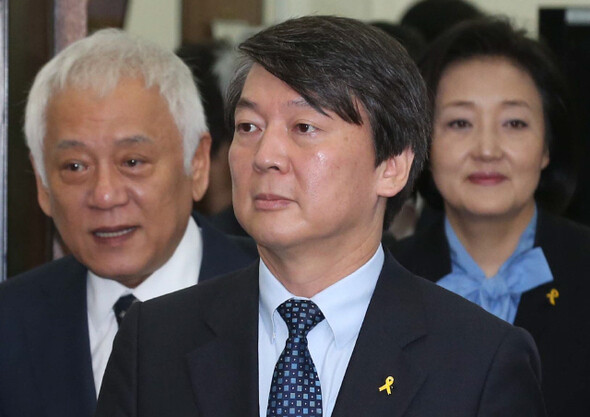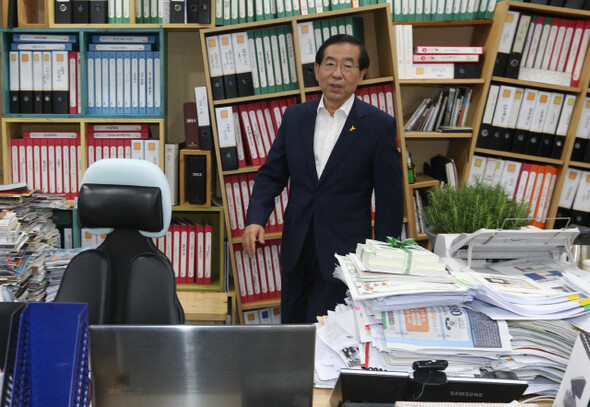hankyoreh
Links to other country sites 다른 나라 사이트 링크
[Analysis] Why can’t political progressives capitalize?

By Lee Se-young, staff reporter
The New Politics Alliance for Democracy (NPAD) won nine large municipal government head positions in Seoul, Gangwon Province, and the Chungcheong and Jeolla regions. It was more than the seven seats its predecessor, the Democratic Party, won in 2012, when it picked up Incheon, Gangwon, North and South Chungcheong, Gwangju, and North and South Jeolla, which has led some to praise its “strong showing.”
But in the greater Seoul area, where it was expected to sweep, the NPAD succeeded in winning only the Seoul mayoral race. Dongyang University professor Jin Joong-kwon summed up the performance on Twitter on June 5, remarking, “It wasn’t the worst case scenario they feared, it wasn’t the ideal outcome they were hoping for.”
Among opposition supporters, opinions on the results are split. Some are blasting the NPAD for failing to meet its base’s expectations, while others share the position of Seoul National University professor Cho Kuk, who said the election “shows how strong the administration and ruling party’s political defenses are despite their fumbling on the Sewol ferry tragedy.” It comes down to the question of whether the poor harvest was the fault of barren soil or a lazy farmer.
Ji Byung-geun, a professor at Chosun University, rated the NPAD’s performance as relatively strong.
“It’s definitely true that public opinion shifted enough to raise excessively high hopes in the wake of the Sewol tragedy,” Ji said. “But you’ve also got to taken to account the fact that President Park Geun-hye has a base of 35-40% who will vote for her no matter what mistakes she makes.”
Researchers hold that the country’s distribution of conservatives vs. progressives has shifted steadily toward the conservative side since Roh Moo-hyun became President in 2002. Those who study South Korean party politics say the balance has moved from a dead-even “50-50” that year to a “60-40” advantage for conservatives today.
But the conservative Saenuri Party’s (NFP) own performance suggests the patting of the opposition’s back is generous. In 2010, the Saenuri’s predecessor, the Grand National Party, had to content itself with six metropolitan government chief seats; this year, it was up to eight. If the fact that the South Gyeongsang and Jeju winners in 2010 were both opposition-leaning independents is taken into account, the recent numbers are a big jump for the ruling party.
Differences between party support numbers in the proportional representation vote and the votes earned by candidates also show Saenuri’s strength. The party support numbers provide a gauge of how much of a support base each of the parties enjoys, and Saenuri led the NPAD in every district except Jeolla, Daejeon, and Sejong. Even in Seoul, when incumbent Mayor Park Won-soon sailed to reelection, Saenuri edged out the NPAD in the party support vote by a 2,201,146 to 2,200,901 margin that left both parties with 45.38% of the vote.
Votes in elections like Wednesday’s tend to be influenced more by personalities, frames, and policies than by voter commitment to a particular political philosophy. Shin Jin-wook, a professor at Chung-Ang University, said the breakdown among the die-hards was about 35% conservative and 25% progressive.
“That means that it all depends on who is more effective at pulling in the 40% in the middle,” Shin said.
This analysis holds that the election outcome isn’t the result of a predetermined 60-40 breakdown favoring conservatives, which means the opposition could potentially put in a good showing.
Indeed, polling results in some of the major battlegrounds ahead of the election showed major shifts around the Apr. 16 Sewol sinking and the deployment of the ruling party’s “wiping the President’s tears” strategy. Support for the ruling party dropped drastically after the tragedy, only to rebound sharply three to four days before the election as the party began making appeals on behalf of President Park. In effect, the opposition lacked the stamina to prevent Saenuri from coming back from behind.
“The NPAD wasn’t able to prepare for the election after the Sewol sinking because it was caught up in the whole ‘no nominations’ debate,” said one second-term NPAD lawmaker from the greater Seoul, area on condition of anonymity. “And in the later stages, all they did was appeal to the public for a ‘vote of judgment.’”

The problem is that this has become a recurring election phenomenon.
“The Democratic Party put all its eggs in the ‘passing judgment on the administration’ and ‘rallying behind one opposition candidate’ baskets in the 2012 general and presidential elections, when there was a lot of public support for holding the Lee Myung-bak administration (2008-2013) to account, and they end up flopping both times,” said an NPAD official on condition of anonymity. “It’s the exact same thing we saw this time around.”
Experts agreed that the problem comes down to the party’s ability to take advantage of the situation.
“Voter values and preferences change, but instead of harnessing all those desires and wishes in one place, the party’s simply treading water,” said Seo Bok-kyung, a professor at Sogang University.
“The ability to harness those changing voter values and desires and create real change is where the politicians and the parties come in, with their leadership, their policies, and their strategies,” Seo added.
Please direct questions or comments to [english@hani.co.kr]

Editorial・opinion
![[Column] Has Korea, too, crossed the Rubicon on China? [Column] Has Korea, too, crossed the Rubicon on China?](https://flexible.img.hani.co.kr/flexible/normal/500/300/imgdb/original/2024/0419/9317135153409185.jpg) [Column] Has Korea, too, crossed the Rubicon on China?
[Column] Has Korea, too, crossed the Rubicon on China?![[Correspondent’s column] In Japan’s alliance with US, echoes of its past alliances with UK [Correspondent’s column] In Japan’s alliance with US, echoes of its past alliances with UK](https://flexible.img.hani.co.kr/flexible/normal/500/300/imgdb/original/2024/0419/2317135166563519.jpg) [Correspondent’s column] In Japan’s alliance with US, echoes of its past alliances with UK
[Correspondent’s column] In Japan’s alliance with US, echoes of its past alliances with UK- [Editorial] Does Yoon think the Korean public is wrong?
- [Editorial] As it bolsters its alliance with US, Japan must be accountable for past
- [Guest essay] Amending the Constitution is Yoon’s key to leaving office in public’s good graces
- [Editorial] 10 years on, lessons of Sewol tragedy must never be forgotten
- [Column] A death blow to Korea’s prosecutor politics
- [Correspondent’s column] The US and the end of Japanese pacifism
- [Guest essay] How Korea turned its trainee doctors into monsters
- [Guest essay] As someone who helped forge Seoul-Moscow ties, their status today troubles me
Most viewed articles
- 1[Column] The clock is ticking for Korea’s first lady
- 2After 2 months of delayed, denied medical care, Koreans worry worst may be yet to come
- 3[Column] Has Korea, too, crossed the Rubicon on China?
- 4Hong Se-hwa, voice for tolerance whose memoir of exile touched a chord, dies at 76
- 5US overtakes China as Korea’s top export market, prompting trade sanction jitters
- 6[Correspondent’s column] In Japan’s alliance with US, echoes of its past alliances with UK
- 7All eyes on Xiaomi after it pulls off EV that Apple couldn’t
- 8[News analysis] After elections, prosecutorial reform will likely make legislative agenda
- 9Samsung barricades office as unionized workers strike for better conditions
- 10More South Koreans, particularly the young, are leaving their religions